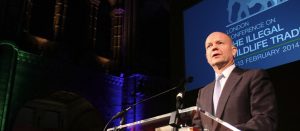
A quarter of a century ago economists, modellers, zoologists and trade experts gathered at the London Zoological Society and, in the face of overwhelming evidence from the forests and savannahs of Africa, the Ivory Trade Review Group pronounced that nothing short of a total ban on ivory would save elephants. The British government had just announced a temporary ban on trade in ivory and over the coming months a cascade of other countries followed, culminating in the ban on all international trade in ivory at the UN wildlife trade forum, CITES.
At the same institution (now re-branded the Zoological Society of London), elephant experts gathered last month, once again under the shadow of calamitous declines in elephant populations across Africa. STE Founder Iain Douglas-Hamilton had been at the 1989 meeting and during an after-dinner speech to delegates on the 11th February 2014 he pointed out the parallels and the positive precedent they gave.
The next morning across London in Lancaster House, the UK government hosted leaders and senior officials from around the world to forge a political path forward, with remarkable results.
The US government set the tone by announcing a ban on the trade in ivory within its borders (as analysed by STE’s Kathleen Gobush). Then five African nations – Botswana, Chad, Ethiopia, Gabon and Tanzania – agreed to sign up for the Elephant Protection Initative – a solid commitment to honour a 10-year moratorium on sales of ivory. This initiative, promoted by the Stop Ivory group of which Save the Elephants is a founding partner, has announced $2 million funding.
The delegates to the government meeting – representing 46 different nations and 11 UN organisations – capped everything off by signing The London Declaration. This strongly-worded document committed signatories – including China and Vietnam – to taking action to reduce demand for wildlife products (such as ivory) and to strengthen relevant laws and their enforcement.
The Declaration also encouraged countries to destroy their ivory stockpiles. A series of nations have taken significant steps in this direction over the past year by destroying some of their stocks of seized ivory: Kenya, Gabon, the Philippines, the USA, China, France and Chad, while others are lining up to do so, such as Hong Kong, which has pledged to destroy a record-breaking 28 tonnes this year. Tanzania, meanwhile, has pledged to put its 113 tonne stockpile beyond commercial use.
UK Foreign Secretary William Hague’s speech:
The London Declaration in full:
https://www.gov.uk/government/news/decisive-action-agreed-on-illegal-wildlife-trade

